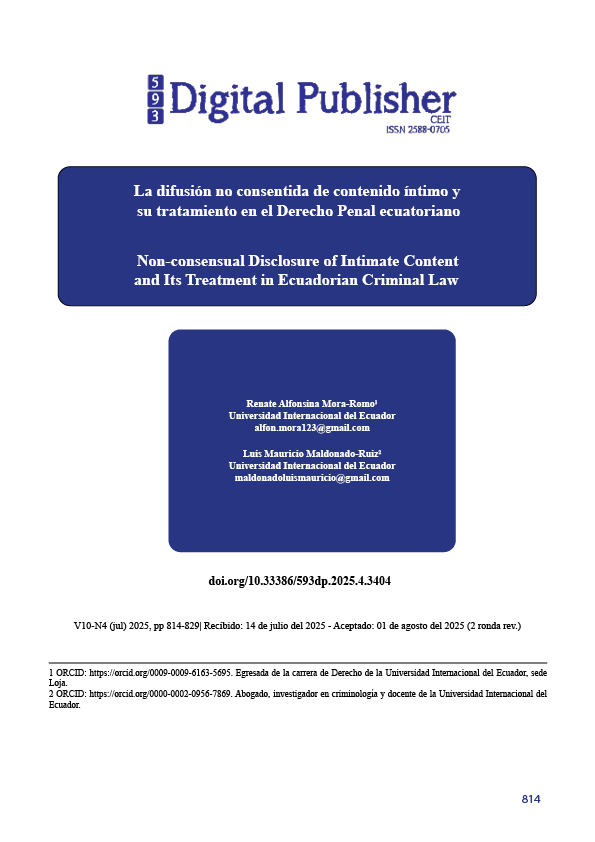Non-consensual Disclosure of Intimate Content and Its Treatment in Ecuadorian Criminal Law
Main Article Content
Abstract
This article analyzes the criminal treatment of the non-consensual dissemination of intimate content in Ecuador, from a dogmatic, normative, and comparative approach. The aim is to examine the legal system’s response to this form of digital violence, which infringes fundamental rights such as privacy, honor, informational self-determination, and sexual freedom. A gender perspective is incorporated to highlight the differentiated impact of this violence on women and gender-diverse individuals. The research is conducted through a qualitative methodology, based on doctrinal, normative, and jurisprudential analysis, identifying legal gaps and limitations in the current criminal framework. Additionally, the role of digital platforms in reproducing harm is examined, as well as the challenges posed by emerging technologies such as artificial intelligence, deepfakes, and the massive circulation of sensitive data. The comparative analysis with the legal systems of Mexico and Spain allows for the identification of good practices and viable proposals that could strengthen the Ecuadorian criminal regulation. In this context, the need to classify this conduct as an autonomous criminal offense is proposed, through legal reforms aimed at incorporating mechanisms for comprehensive victim support and developing prevention strategies based on digital education, technological ethics, and shared responsibility among involved actors. The goal is to build an effective criminal law response that addresses the specific challenges posed by the digitalization of violence, without losing sight of fundamental rights standards.
Downloads
Article Details

This work is licensed under a Creative Commons Attribution-NonCommercial-ShareAlike 4.0 International License.
1. Derechos de autor
Las obras que se publican en 593 Digital Publisher CEIT están sujetas a los siguientes términos:
1.1. 593 Digital Publisher CEIT, conserva los derechos patrimoniales (copyright) de las obras publicadas, favorece y permite la reutilización de las mismas bajo la licencia Licencia Creative Commons 4.0 de Reconocimiento-NoComercial-CompartirIgual 4.0, por lo cual se pueden copiar, usar, difundir, transmitir y exponer públicamente, siempre que:
1.1.a. Se cite la autoría y fuente original de su publicación (revista, editorial, URL).
1.1.b. No se usen para fines comerciales u onerosos.
1.1.c. Se mencione la existencia y especificaciones de esta licencia de uso.
References
Álvarez González, A. (2023). Universitarias frente a la violencia digital hacia las mujeres. Revista Latinoamericana de Ciencias Sociales, Niñez y Juventud, 21(1), 106–118. https://doi.org/10.11600/rlcsnj.21.1.106
Asamblea Nacional del Ecuador. (2014). Código Orgánico Integral Penal. Registro Oficial Suplemento No. 180, 10 de febrero de 2014.
Asamblea Nacional del Ecuador. (2021). Ley Orgánica de Protección de Datos Personales. Registro Oficial Suplemento No. 459, 26 de mayo de 2021.
Beyens, I., & Lievens, E. (2016). A legal perspective on the non-consensual dissemination of sexual images. International Journal of Law and Information Technology, 24(2), 122–144. https://doi.org/10.1093/ijlit/eaw008
Castells, M. (2009). The rise of the network society (2nd ed.). Wiley-Blackwell.
Citron, D. K., & Franks, M. A. (2019). Deepfakes and the new disinformation war. Foreign Affairs.
Comisión de Derechos Humanos de la Ciudad de México. (2020). Informe de violencia digital contra mujeres y niñas. https://cdhcm.org.mx/wp-content/uploads/2021/03/InformeViolenciaDigital.pdf
Congreso de la Unión (México). (2021). Decreto por el que se reforman y adicionan diversas disposiciones en materia de violencia digital, “Ley Olimpia”. Diario Oficial de la Federación, 1 de junio de 2021.
Corte Constitucional del Ecuador. (2021). Sentencia No. 2064-14-EP/21 (recurso de hábeas data por fotos íntimas), 27 de enero de 2021.
Corte Constitucional del Ecuador. (2022). Sentencia No. 77-16-IN/22 (acción de inconstitucionalidad contra reglamento de interceptación de datos), 27 de enero de 2022.
Corte Interamericana de Derechos Humanos. (2017). Opinión Consultiva OC-24/17. Identidad de género, e igualdad y no discriminación a parejas del mismo sexo. San José, Costa Rica. Recuperado de https://www.corteidh.or.cr/docs/opiniones/seriea_24_esp.pdf
Durán Seco, I. (2025, enero 8). El delito de difusión no consentida de captaciones íntimas de la imagen consentidas: Art. 197.7 CP. Algunos problemas interpretativos del tipo (1.ª ed.). Tirant lo Blanch. ISBN 978 84 1071 849 4
Granja Zurita, D. F., Arias Torres, D., Salame Ortiz, M. A., & Torres Mancheno, L. P. (2024). La protección de la libertad sexual de la víctima ante la práctica de stealthing en Ecuador. Dilemas Contemporáneos: Educación, Política y Valores.
González Cussac, J. L. (2024). Perspectiva de género y derecho penal: Violencia de género y delito. Tirant lo Blanch.
Ferrajoli, L. (2001). Derecho y razón. Teoría del garantismo penal (2.ª ed.). Editorial Trotta.
Hernández López, J. M. (2023). ¿Por qué debemos proteger la privacidad? Cronología, textos y notas sobre intimidad, vida privada y protección de datos (1.ª ed., pp. 234–255). J. M. Bosch Editor.
Lamas, M. (2005). Cuerpo: diferencias y derechos. Taurus.
Medios sin violencias: La urgencia de políticas de abordaje y prevención en América Latina. (2024). Comunicación para la igualdad, UNESCO/PIDC & FEPALC (pp. 127–141).
Ochoa Pineda, A. C., & Aranda Torres, C. J. (2019). Sexting: signo de identidad juvenil en la sociedad digital (1.ª ed.). Universidad del Azuay.
Organización para la Cooperación y el Desarrollo Económicos (OCDE). (2022). Las personas primero en la transformación digital: Documento de referencia para la Conferencia Ministerial del CDEP. https://www.oecd.org/content/dam/oecd/es/publications/reports/2022/11/putting-people-first-in-digital-transformation_9ec06c69/eee97842-es.pdf
Ortega Idrovo, G. V., & Trelles Vicuña, D. F. (2024). La inconstitucionalidad del inciso segundo del artículo 178 del Código Orgánico Integral Penal. Visionario Digital, 8(2). https://doi.org/10.33262/visionariodigital.v8i2.3030 Pizarro Moreno, E. (2022). El derecho a la intimidad de Warren y Brandeis: traduttore, traditore y notas (1.ª ed.). Dykinson.
España. (1995). Código Penal español, Ley Orgánica 10/1995, de 23 de noviembre. Boletín Oficial del Estado (BOE), núm. 281, 24 de noviembre de 1995. (Reformado por la Ley Orgánica 1/2015, de 30 de marzo).
Ley Olimpia. (2019). Ley general de acceso de las mujeres a una vida libre de violencia, reforma a diversos artículos del Código Penal y la Ley General de Salud en México. Diario Oficial de la Federación.
Salgado Espinosa, L. A., & Lauchy, M. L. (2019). Violencia digital contra las mujeres en México: Caracterización, efectos, experiencias y redes. Femeris: Revista Multidisciplinar de Estudios de Género, 7(3), 29–42. https://doi.org/10.20318/femeris.2022.7150
Rodríguez Pascual, I., & Blanco Miguel, P. (2020). La violencia, ¿es una realidad persistente de la adolescencia del siglo XXI? Universitas, 32, 121–138. https://doi.org/10.17163/uni.n32.2020.06
Segato, R. (2016). La guerra contra las mujeres. Traficantes de Sueños.
Sentencia de la Corte Constitucional del Ecuador. (2020). Sentencia No. 007-20-SMP-CC. Recuperado de https://www.corteconstitucional.gob.ec
Sentencia del Tribunal Supremo de España. (2020). Sentencia 641/2020, de 26 de noviembre. Tribunal Supremo de España. Recuperado de https://www.poderjudicial.es
Teubner, G. (1993). Law as an autopoietic system. Blackwell.
Torres Manrique, J. I., Carli, A. A., & Moreira Domingos, I. (2023). Violencia digital y derecho penal. En J. I. Torres Manrique (Coord.), Tratado de bioética, cibernética y derecho digital. Desde el balcón de los derechos fundamentales (pp. 383–388). Lima: Palestra Editores.
Villagrán, A. M., Martín-Fernández, M., Gracia, E., & Lila, M. (2020). Adaptación y validación de la Escala de Actitudes de Culpabilización de la Víctima en Casos de Violencia de Pareja contra la Mujer (VB-IPVAW) en población ecuatoriana. Revista Latinoamericana de Psicología, 52, 243–252. https://doi.org/10.14349/rlp.2020.v52.24
Warren, S. D., & Brandeis, L. D. (1890). The right to privacy. Harvard Law Review, 4(5), 193–220. https://doi.org/10.2307/1321160
Zaffaroni, E. R., Alagia, A., & Slokar, A. (2013). Derecho penal. Parte general (2.ª ed.). Ediar.



